The Mailer Review/Volume 11, 2017/Norman Mailer in Long Branch
| « | The Mailer Review • Volume 11 Number 1 • 2017 | » |
Barbara Mailer Wasserman
Note: This address was delivered to the annual meeting of the Norman Mailer Society on Saturday, October 1, 2016 at Monmouth University in West Long Branch, New Jersey.
URL: https://prmlr.us/mr17wass
I am going to talk today about how important Long Branch was to the family of Fannie Schneider Mailer, Norman’s and my mother, and also to Norman and me as we were growing up. Some of you may have attended the panels and learned a bit about the history of the town as a summer resort, but for those who haven’t, I think a brief account would help.
Long Branch was settled in 1668 by a small group of men who negotiated with the local Indians. One of these men was named John Slocum. I don’t know if Dr. Slocum was actually a descendant, but he was our mother’s doctor, and delivered both Norman and me.
Fast forward to the 19th century. Around the 1830s, Long Branch had become a resort for people from Philadelphia. In 1839, in a publication called the Knickerbocker Review, a gentleman from Philadelphia extolled the town as a summer idyll. He claimed that it delighted him more than all the watering places in Europe that he had been to, but that it was already going downhill, as the Philadelphia society families had begun to desert it.
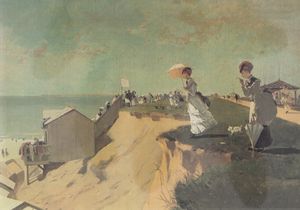
However, in 1869 President Grant decided to come to Long Branch for a summer vacation. He loved it and came back every summer for 12 years. The Monmouth Race Track was opened in 1870. Between the track and Ulysses Grant, the town became the premier summer resort of the 1870’s decade. It was more popular than Newport or Saratoga. And Presidents Hayes, Garfield, and Arthur continued the presidential seal of approval by making Long Branch their summer venue. I imagine that at a time when transportation was slower than it is now, it was an advantage to be closer to Washington DC than Newport and Saratoga were. And Long Branch was beautiful, as this 1869 Winslow Homer painting depicts it.
However, as time went on, the racing and gambling elements began to alienate the upper echelons. Many of the wealthy aristocrats moved back to Newport. And when the race track was closed by state law in 1893, Long Branch lost the sporting group too, and began to decline.
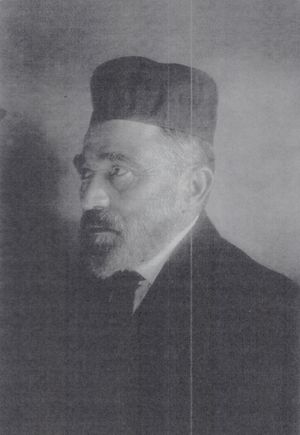
Our grandfather, Chaim Jehudah Schneider, with perfect timing, arrived in Long Branch in 1893 or 1894. He had arrived in the country a year or two before, had stayed in New York briefly, trying as had so many others to make a living with a pushcart on the lower east side. The pushcart was quickly and easily vandalized by neighborhood thugs and he realized that the city was not the place for him. He took the cart to New Jersey and, probably through people he knew, took a stint teaching Hebrew to the sons of the Michelson family in Belmar. Years later, one of those sons, Harry, married Jennie, one of Grandpa’s daughters.
Meanwhile, our grandmother’s brother, Isaac, had settled into the small orthodox Jewish community that had settled in Long Branch. They were in need of a rabbi and, since Grandpa had been ordained at the end of his talmudic studies in Russia, he was induced to come. He was reputedly happy to function as a rabbi as long as he wasn’t paid, and so he did just that for some years until the congregation grew large and rich enough to hire a rabbi. In the meantime, his family was arriving and he needed to make a living. I’m not sure exactly when, but he opened a food and meat market. He knew nothing about butchering, and probably would have felt that it wasn’t something he wanted to do, but he had the “bonafides” to bless the meat and make it ritually acceptable. And they hired a butcher. Our grandmother provided appetizers, and the children, as they grew, tended the store. Everyone in the family worked.
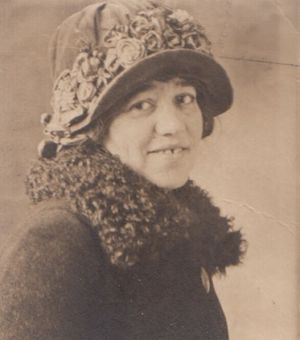
The oldest daughter, our Aunt Beck, learned English in a few months and, when she was only twelve, went to New York to order the meat. That’s a photo of her some years later, around 1915.
Jennie and Rose were the other sisters, and here is a picture of them with Mother. When she was old enough, Mother would get up at 4:00 or 5:00 in the morning to open the shop. That was probably in the summer, because in the winter she went to school. Before leaving for school, she and Rose would have to make all the beds in the house. Because it was a summer resort town, the winters were dull, the store was not profitable, and they were always short of cash. In the summers, however, when many Jewish families came to town, and the hotels were open, the store did well. When she was still a little girl, Mother liked going with her brother Joe on the truck from which he delivered orders to the hotels. While he would take the order in, she would watch the people milling around the hotel, admiring their clothes, listening to the music of the bands that played, and wondering if she would ever be able to have a good time like that. Years later, the family went into the hotel business and she had a more nuanced view of what went on.
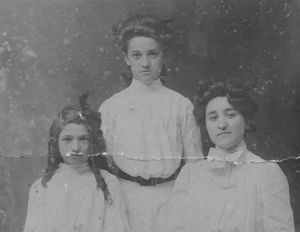
One of the things I find interesting about the life of my family in Long Branch was how socially stratified the town was. In one of the houses the family lived in, the kids next door were not Jewish. They not only did not become friends, but would yell “Christ Killer” across the fence, something Mother never forgot. And even among the not very large Jewish population, there were all sorts of divisions. The German Jews in town wanted nothing to do with the Eastern Jews and they had a separate part of the cemetery. Among the Eastern Jews, the Litvaks and the Galicianers looked down upon each other. And then there were religious Jews and the political Jews. Mother said that there were a couple of boys at school that she rather liked, who would walk her home after class, but that the boys’ family was political and she couldn’t ask them to come into the house because her father would call them Bolsheviks. Indeed, I have often wondered about my grandfather, why this reputedly brilliant man, to whom New York rabbis would come to have him discuss and maybe settle Talmudic disputes that they were having, who could look at a wall and tell you how many bricks there were in it, who knew both Yiddish and Hebrew, and who was only in his early thirties when he arrived here, yet never learned English well enough to function in it. I can only assume that he brought with him from Russia a ghetto mentality, in which one saw the world as increasingly foreign and hostile circles surrounding the family center.
Chaim spent less and less time in the store. Not only did he prefer to study the Talmud, but because he tended to undercharge or give away food to customers that he thought were needy, his children encouraged him to stay at home.
The store did well enough to enable the family, after years in several rented homes, to buy one of their own, and in 1906 they moved into a lovely house on Morris Avenue.
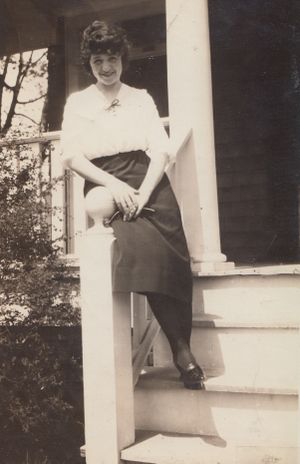
That is Mother, sitting on the steps to the porch. The property was large, about the size of two city blocks. It included several buildings, and a forty-room building across the street. The first summer there they rented it to someone who ran it as a hotel. Seeing how well it did, our grandmother decided that it would be more profitable to run it themselves. And that was how they got into the hotel business. The Maple Hotel, as it was called, lasted only a couple of years. Like so many Long Branch hotels, it burned down. But the family was hooked.
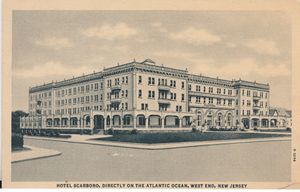
For the next few years they rented and ran other summer hotels. Then, in 1915 or 1916, our Aunt Beck, heard that the lease for the Scarboro Hotel was available and she and her husband, Louis, took over the lease and were able to buy the hotel a couple of years later.
Our grandparents ran it with them for two or three years, but Louis thought Grandma too Old World—she would, for instance, before dinner, fill her apron with oranges and put one down at each setting. (I suppose that an orange was for her a symbol of luxury.) Our grandparents rented other hotels and in the early 1920s they bought Kingsley Court, a compound of three very large houses, called cottages, a la the Newport mansions.
I’m not sure whether Norman’s middle name was used to name the hotel, or if he was named after it. I’ve been told he was named for our father’s uncle, whose Hebrew name was Nochom Melech, which translates roughly as Norman King, so it’s likely that the hotel was named for him.
It was at Kingsley Court that one of the famous Norman stories happened, a story that foretold his penchant for the dramatic. He was probably two and a half years old, went into one of the public bathrooms, locked the door, and then when ready to leave, found that he could not manage to unlock it. Fortunately, the bathroom had a window which looked out on the grounds where several people were sitting. Norman leaned out the window and shouted down to them, “Goodbye everybody forever.”
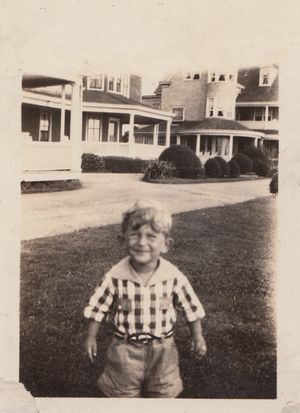
Our mother was involved in running Kingsley Court and, with her parents, lived there during the winter with Dad commuting from New York (I think the Morris Avenue house had been sold). But things did not go well. One winter the heat broke down, they couldn’t get it fixed, and all moved into the hotel that brother Joe and his wife were running in another part of town. They didn’t know that the property came with riparian rights to the beach across the street, so they didn’t know that their guests could use it, which of course would have made the rooms more desirable. In 1924, the Ku Klux Klan came to Long Branch in force. On July 4th, the Klan held a huge four hour parade of hooded marchers. Its effect on Long Branch was temporarily disastrous. Jewish summer residents and guests departed en masse. Blacks and Catholics holed up in their houses. The town was left with empty hotels and ruined shopkeepers. As a result, the local business people who had become involved with the Klan stopped supporting it. So the Klan departed. But I suspect that for the hotel business, the summer of 1924 was pretty much a bust. Mother always said they lost Kingsley Court. I guess that when they had to sell it in 1925, they got little or nothing above the mortgage.
From that time until 1929, Mother was not involved in the hotel business. She was pregnant with me and her parents were failing. They died in 1928 and she and Dad moved to Brooklyn. But beginning in 1929, our Aunt Jennie, rented and ran a summer hotel. One was called the New Howland and was on Ocean Avenue a few blocks south of the Scarboro, and later, another hotel on, I think, Bath Avenue, which may have been called the New Atlantic. There were a lot of hotels with “New” in their names, because as I have said, they all kept burning down. The original Howland Hotel in the 19th century had been famous, and so there were several hotels in the following years that were called New Howland. We spent four summers in those hotels, Mother helping Aunt Jen out.
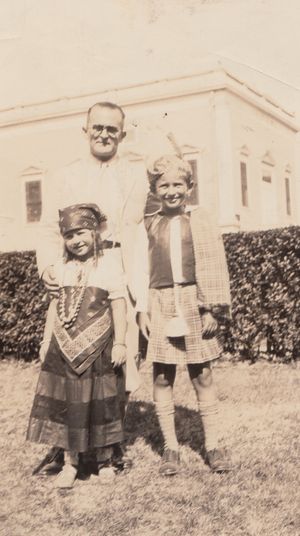
My primary memories of those summers are the masquerade parties. I loved them. I’m not sure that Norman did. Jennie ran the hotels for four years through 1932, probably the worst years of the Depression, and then gave up. For a couple of summers we stayed in Aunt Jen’s house in Long Branch and I think that it was probably in those summers that Adele or Sylvia would walk me past Shadow Lawn, the estate that this University now occupies, and as I gazed in awe through the fence at the mansion on the hill, she would proudly tell me that it had been the summer White House for President Wilson. I’m sure that at that time I never expected to see the inside.
In 1935, we began to spend our summers at the Scarboro.
Both Mother and Dad were working during the week in New York, but we were coddled by all our aunts and uncles and older cousins, Cy and Osie, Sylvia and Adele, whom we adored. I wanted to be an opera singer like Osie, and Cy was Norman’s hero. In the 1960s, Norman wrote an introduction to Cy’s book The End of Obscenity, in which he described how he had felt about him when he was a boy:
he was very much an older brother all through my childhood, and I worshipped him. . . . He was one of the few people I have ever known who had a happy look on his face when he came to bat in the late innings with men on base, his side behind, and the need for a homer prominent in everyone’s head. Indeed he had his smile because it was slightly better than even money he was going to hit that homer. . . . He was the only figure I encountered in my childhood (the Depression years) who seemed to believe it was more natural to win than to lose, and that life was therefore to be enjoyed. . . .
That my brother was so obviously in awe of him, made me as a child feel that Cy inhabited some other planet. I think I didn’t dare say a word to him until I was twenty years old.
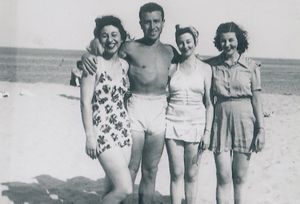
How we loved those summers. The long days on the beach across the street. The exciting New Jersey surf. Learning to dive into what seemed like towering waves. An occasional visit to the West End Casino, a beach club some relatives belonged to, and where Norman taught me or cajoled me into jumping into the pool from the ten-foot diving board. Walks down the boardwalk to the pier, which had a few rides like a carousel and bumper cars, and a booth where one could see a brief keystone cop type silent movie by turning a crank that riffled through the frames. And always an ice cream cone to accompany the walk home. On rainy days, we played card games, from “Go Fish” to “Poker.” Or envied the ladies playing mahjongg, because the sound and the designs of the tiles seemed like such a sensuous pleasure. And, of course, there were hours and hours of just reading books. It was a heaven of long, unstructured summer days. I felt sorry for those friends of mine who went to camp. Not until years later did I realize that what I had missed out on was sport instruction like tennis or horseback riding. I didn’t even learn to swim very well. Norman made some effort to teach me, but I didn’t like the crawl. I preferred the eternal thrill of jumping the waves.
One of my memories of that first year or two at the Scarboro was the abandoned Hearn Estate on South Bath Avenue across the street from the hotel. We used to sneak in over a wall and wander around. The buildings were gone, the stone paths were cracked, with weeds growing through them, and plants and trees, burgeoning into strange shapes made one feel as if we had wandered into a romantic tale from the distant past.
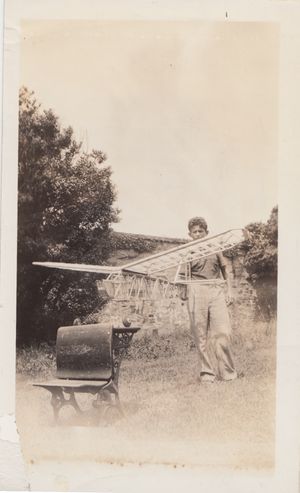
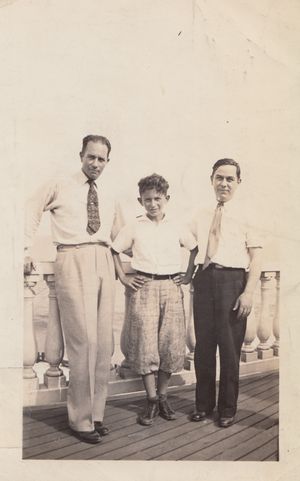
In 1935 or 1936, Norman had become an avid builder of model airplanes, and had decided that he would be an aeronautical engineer. His planes kept crashing when he tried to fly them and mostly they just decorated our home, hanging from the chandeliers, but that didn’t deter him. So he was thrilled that summer when two, well known men showed up at the hotel: Vincent Burnelli, an airplane designer, and Clyde Pangborn, a test pilot who was flying Burnelli’s designs. I’m sure the highlight of the summer for Norman was that he got to meet them.
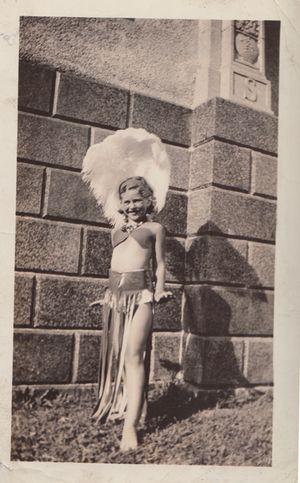
For me, the highlight of the summer of 1936 was the masquerade to which I came as the Queen of Sheba, the costume designed and the pose dictated by our cousin Osie, Aunt Beck’s daughter.
The summer of 1939 at the hotel was memorable. Among the guests was a family of beautiful daughters. The mother of this brood had made it absolutely clear to her daughters that they must marry rich men. I think she must have been quite open about this since everybody knew it and, indeed, our family, with its reverse snobbery, rather looked down upon them. The oldest was married. The second one, probably in her early twenties was, as they said, marriageable and the youngest one, who was fifteen or sixteen, was the most beautiful of them all. They also had a younger brother, who was my age—twelve. My Uncle Alec, my father’s youngest brother, who was visiting from South Africa, fell in love with the middle daughter. Norman developed a crush on the youngest, and I had a crush on the brother, who, as I remember, hardly gave me the time of day. The beauty seemed unimpressed with all the boys who hung around her, including Norman. And while the middle daughter seemed to like Alec and welcomed his attentions, when she discovered that he had no money, she dropped him. Here we were, the three rejects.
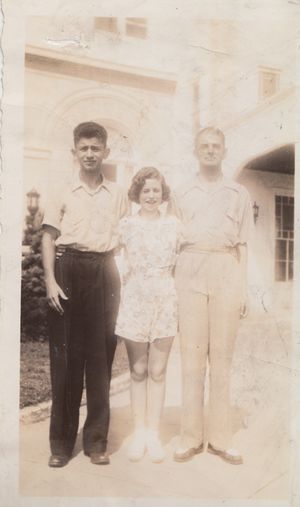
By the end of that summer, World War II started in Europe. And our lives began to change. Norman went off to Harvard and realized that he didn’t want to be an aeronautical engineer. He wanted to be a writer. And write he did—one short story after another. By the summer of 1941, he had won the Story Magazine contest and was embarking on a novel—“No Percentage.” (Some of you may have heard the sections that were read so dramatically a couple of hours ago.) At the Scarboro, Aunt Beck provided Norman with an unoccupied room in which to work. As I remember, he worked just about every day, and finished the novel by the end of the summer. At night we hung out together, he with a friend of mine, and I with a friend of his. Citizen Kane came out, I think in August, and we went to Asbury Park to see it. I still remember how exciting that was. We had never seen a movie like it, and if I didn’t myself recognize all the unusual aspects and techniques that Welles had used, Norman certainly pointed them out to me. I was fourteen and I felt very grown up.
Then, suddenly, our summers in Long Branch ended. Shortly after we got home to Brooklyn, in September or October, like so many of the great hotels in Long Branch history, the Scarboro caught fire and burned to the ground.
I don’t know how much we realized it at the time, but it was, for the family, the end of an era.
About fifteen years later, one summer day in New York, Norman and I and our spouses and several friends, decided to go to the beach. Norman suggested that instead of coping with Long Island traffic, we drive down to Long Branch where we’d hardly been since the summer of ’41. There were a lot of us, so we went in two cars, Norman in one and I in the other, since we were the only ones who supposedly knew where we were going. Blithely, the two of us agreed to meet at the corner where we remembered the boardwalk ended and Ocean Avenue turned a block inland. As it turned out, we had a hard time hooking up. The waterfront had changed. I think there had been erosion, and the corner where we had expected to meet no longer existed. Ocean Avenue had turned inland sooner. And we both wondered if the other one would realize what had happened. We did eventually find each other, but I don’t remember whether we ever got to go swimming that day. I only remember the ache one feels when one realizes for the first time that the past seems irrevocably gone.


